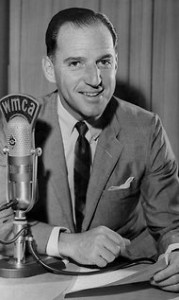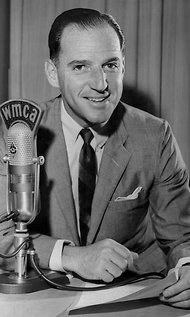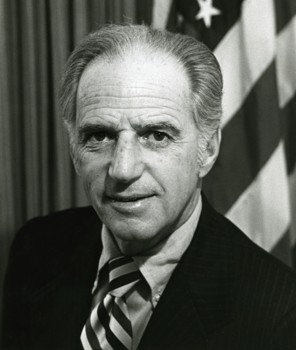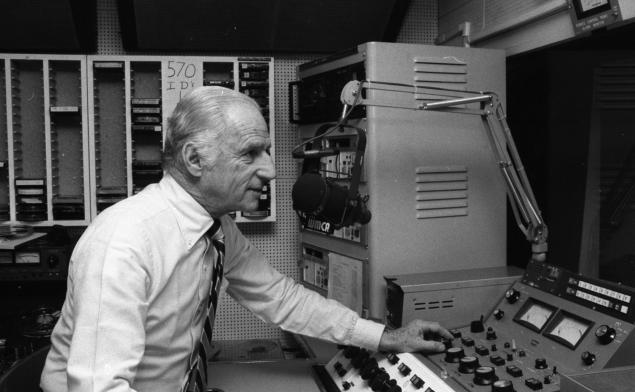
WMCA 1960’s
At WMCA 570 AM, New York, station president R. Peter Straus combined Top 40 music with socially conscious journalism and ground-breaking public service to animate broadcasting’s most successful and influential big-city mom and pop radio station. I joined WMCA in 1959, about a year after Peter succeeded his father, Nathan Straus, as station president. For nearly six years in the news room, I witnessed and participated in events WMCA both covered and created with its two-fisted documentaries, independent news service, precedent-setting editorials, and a historic crusade for voting justice. Credit for WMCA’s best years as a top-rated station is shared by many people, but the first-of-its-kind balancing of jukebox and soap box that made that prominence possible, was by the design and direction of R. Peter Straus. Edward Brown
New York Daily News and New York Times stories follow below
R. Peter Straus in WMCA studio, mid 1980’s. NY DAILY NEWS photo: Jack Smith
R. Peter Straus, populist WMCA radio host and NYC fixture, dead at 89
Liberal Democrat radio icon made rock n’ roll fun, too
By DAVID HINKLEY/ NEW YORK DAILY NEWS
R. Peter Straus, a blueblood who used his WMCA radio station to fight for populist causes, pioneer talk programming and make rock ‘n’ roll fun, died Monday at his Manhattan home. He was 89, and even people who disagreed with his liberal Democratic politics hailed him as a man who loved his radio station and the medium passionately.
“Peter Straus was one in a million,” said Tom Tradup, now with Salem Communications and Straus’s talk program director from 1980 to 1983. “WMCA was a petri dish of talk radio creativity, with legends like Barry Gray, Bob Grant, Bruce Williams and Barry Farber.” While he employed hosts across the political spectrum because he thought they were entertaining, he also used his 5,000-watt signal to broadcast his own beliefs. He was one of the first station owners to broadcast editorials, endorsing John F. Kennedy for President in 1960 and calling for the resignation of Richard Nixon early in the Watergate scandal. But his station was better known as one of the first and most endearing homes for rock ‘n’ roll.
Deejays like Scott Muni, Murray the K, Harry Harrison, B. Mitchell Reed and Dan Daniel passed through WMCA, and Straus was one of the first owners to hire a black jock for a “rock ‘n’ roll” station when he signed the late Frankie Crocker. WMCA jocks were collectively known as “The Good Guys” in that wholesome era, and they delighted in waging guerrilla war against the much larger WABC
The battle between the two stations over who “owned” the Beatles became city radio legend. “WABC was bigger, but I always thought we had more fun,” said Dan Daniel years later. “And I think the fact there were two competing stations made them both better and made it a lot more entertaining for the listeners.” Straus turned WMCA to talk in 1970 and sold it in 1986.
Born in Manhattan, Straus was the son of a Roosevelt administration official and state senator who bought his first radio station in 1943. Straus’s grandfather was Nathan Straus, owner of Macy’s and Abraham and Straus. His great-uncle Isidor was a congressman who went down on the Titanic.
A Yale graduate and World War II veteran, he joined WMCA as program director in 1948. During his years at the station he also worked in the Lyndon Johnson administration and directed the Voice of America from 1977 to 1979. He and WMCA filed a lawsuit in 1961 charging that the state legislature was violating the Constitution by giving rural areas disproportionate representation. That suit, folded in with others, led to the U.S. Supreme Court’s 1964 “one man, one vote” decision.
Straus even had brushes with history in his personal life. His first wife Ellen Sulzberger, a niece of Times publisher Arthur Ochs Sulzberger, died in 1995 after they had been married 45 years. In 1998 he married Marcia Lewis, mother of White House intern Monica Lewinsky.
But active as he was in social, political and economic circles, Tradup says Straus never lost touch with WMCA. Tradup recalls the time when night host Long John Nebel, late in his legendary career, was reading spots for a Brooklyn funeral home on his show. “Peter would ask the WMCA business department about them,” Tradup says, “and they professed not to know anything. “So one night Peter and Ellen were riding to a party and he heard the spot again. He had his driver turn the car around and barge into the station to get the straight story.”
Nebel, it turned out, had cut his own deal with the funeral parlor to run the spots in return for, when the time came, handling Nebel’s arrangements and burial. “Those were in the bygone days,” says Tradup, “when a station owner in New York actually listened to his property.”
http://www.nydailynews.com/authors?author=David Hinckley

WMCA 1960’s
NYTIMES photo
R. Peter Straus, WMCA Radio Pioneer, Dies at 89
By robert d. McFADDEN – NEW YORK TIMES
Published: August 8, 2012
R. Peter Straus, who took over WMCA in New York in the late 1950s and turned it into one of the nation’s most innovative radio stations, broadcasting what are regarded as the first radio editorials and political endorsements and helping to popularize rock ’n’ roll, died on Monday at his home in Midtown Manhattan. He was 89.
His daughter Diane Straus Tucker confirmed his death.
The son of a radio entrepreneur and the scion of a family steeped in public service, Mr. Straus counted diplomats, cabinet officials, legislators and philanthropists among his forebears, and became a United Nations official, director of the Voice of America and the administrator of American aid to Africa.
He also became a plaintiff in a historic reapportionment lawsuit that forced New York’s Legislature to give cities increased representation. It became an integral part of the Supreme Court’s “one person, one vote” ruling, which concluded that many state legislatures were unconstitutionally unbalanced in favor of sparsely populated rural areas.
But his most memorable contributions were in radio. Long before NPR created a network for high-quality news, music and discussion programs, WMCA pioneered public service radio in New York. It was the first station in the country to run editorials on political and civic issues, with Mr. Straus himself reading opinions on the air, and the first to endorse a presidential candidate, backing John F. Kennedy in 1960.
In December 1963, “I Want to Hold Your Hand” wailed out over WMCA, and Beatlemania, with a big boost from the station, soon engulfed the region. It was hardly a surprise. WMCA had been playing rock ’n’ roll since the 1950s, and WMCA’s Top 40 format, along with that of its fierce rival WABC, dominated the New York airwaves through the 1960s. WMCA’s disc jockeys, known as the Good Guys, became almost as well known as the stars whose records they played.
It is what the people want to hear, Mr. Straus said.
After Mr. Straus converted the station to an all-talk format in 1970, WMCA was known for years as a forum for liberal causes. It was the first station to call for the resignation of President Richard M. Nixon in the Watergate scandal, and the first to ban cigarette advertising and to accept ads from abortion rights advocates and makers of contraceptives.
It broadcast “Call for Action” programs featuring an ombudsman to help listeners who had problems with government agencies, corporations and landlords, and “Crime Stoppers,” to help the police solve crimes. It also accepted ads from the Patrolmen’s Benevolent Association and put public officials like Gov. Mario M. Cuomo and Mayor Edward I. Koch on the air to answer questions from listeners.
“We like to think occasionally we give voice to the voiceless,” Mr. Straus said in 1983. “We want to be broadcasters, but we want to make a difference.”
WMCA, 570 on the AM dial, was founded in 1925, broadcasting from the McAlpin Hotel, from which the call letters were derived. It was bought by Nathan Straus Jr. in 1943. Its programming included popular music, dramas, New York Giants baseball games and, in the postwar years, a remarkable run of music and talk featuring Barry Gray, sometimes called “the father of talk radio,” and disc jockeys like Scott Muni and Murray Kaufman, a k a Murray the K.
By 1986, WMCA was the last privately held station in a leading urban market when Mr. Straus sold it to Federal Enterprises of Detroit for $10 million. In 1989 it was sold again, to Salem Communications, which adopted the Christian format that continues today.
Ronald Peter Straus, who almost never used his first name, was born in Manhattan on Feb. 15, 1923, the son of Nathan Straus Jr. and Helen Sachs Straus. His father, who became director of the United States Housing Authority under President Franklin D. Roosevelt and a New York State senator, bought WMCA in 1943. The company, Straus Communications, later owned many radio stations and newspapers in the Hudson Valley and New Jersey.
Peter had other notable antecedents: his grandfather, Nathan Straus Sr., was a philanthropist who co-owned R. H. Macy and Abraham & Straus department stores. A great-uncle, Isidor, was a congressman who went down on the Titanic in 1912; another, Oscar Solomon, was ambassador to the Ottoman Empire and President Theodore Roosevelt’s secretary of commerce and labor.
After attending the Lincoln, Riverdale Country Day and Loomis schools, Mr. Straus majored in international relations and American government at Yale and graduated in 1943, a year early, under a World War II program. He became a B-17 pilot and flew 35 bombing missions over Germany. After the war he worked in public relations for a time, then joined WMCA as program director in 1948.
In 1950 he married Ellen Louise Sulzberger, a niece of Arthur Hays Sulzberger, publisher of The New York Times. She died in 1995.
Mr. Straus and his second wife, Marcia Lewis, mother of the former White House intern Monica Lewinsky, were married in 1998. They were introduced by a mutual Washington friend in 1997, months before the scandal of Ms. Lewinsky’s relationship with President Bill Clinton became public in January 1998. Mr. Straus said later that he had met Ms. Lewinsky once or twice, but declined to comment on her or the president, whom he had known for years. Ms. Lewis was divorced from Ms. Lewinsky’s father, Bernard Lewinsky, a California doctor, in 1987.
In addition to his daughter Diane, his wife and his stepdaughter, Mr. Straus is survived by three other children from his first marriage, Katherine Straus Caple, Jeanne Straus and Eric Straus; two brothers, Irving and Nathan; a stepson, Michael Lewinsky; and nine grandchildren.
Mr. Straus left WMCA in 1950 to become an executive of the International Labor Organization, a United Nations agency in Geneva. He returned to WMCA in 1958, succeeded his father as president in 1959 and became chief executive when his father died in 1961.
In 1961, he and WMCA filed a federal lawsuit that led to the reapportionment of the State Legislature and became incorporated into a block of cases that produced the Supreme Court’s “one person, one vote” decision in 1964. That ruling affected more than 30 legislatures whose seats had been unfairly apportioned, with more power going to rural areas than cities.
 Long active in Democratic politics, Mr. Straus was President Lyndon B. Johnson’s assistant administrator for aid to Africa in the Agency for International Development from 1967 to 1969, and director of the Voice of America under President Jimmy Carter from 1977 to 1979.
Long active in Democratic politics, Mr. Straus was President Lyndon B. Johnson’s assistant administrator for aid to Africa in the Agency for International Development from 1967 to 1969, and director of the Voice of America under President Jimmy Carter from 1977 to 1979.
He was also the author of “Is the State Department Color Blind?” (1971), “The Buddy System in Foreign Affairs” (1973) and “The Father of Anne Frank” (1975).
Daniel E. Slotnik contributed reporting.
http://www.nytimes.com/2012/08/09/business/r-peter-straus-wmca-radio-pioneer-dies-at-89.html
VOA photo of R. Peter Straus added by WNEW1130 editors


An e-mail came in response to the R. Peter Straus story, from Quincy McCoy (WNEW Program Director 1985-1991)
“Thank you for this. The first radio station I worked for was owned by Mr Straus–WTLB, Utica New York. Our I.D.s always said WTLB, UTICA a Member of the Straus Broadcasting Group. He was a man of high moral integrity. He insisted that his radio stations employed women and minorities and offered internships to college students. He helped create many a broadcasting career.”
Quincy